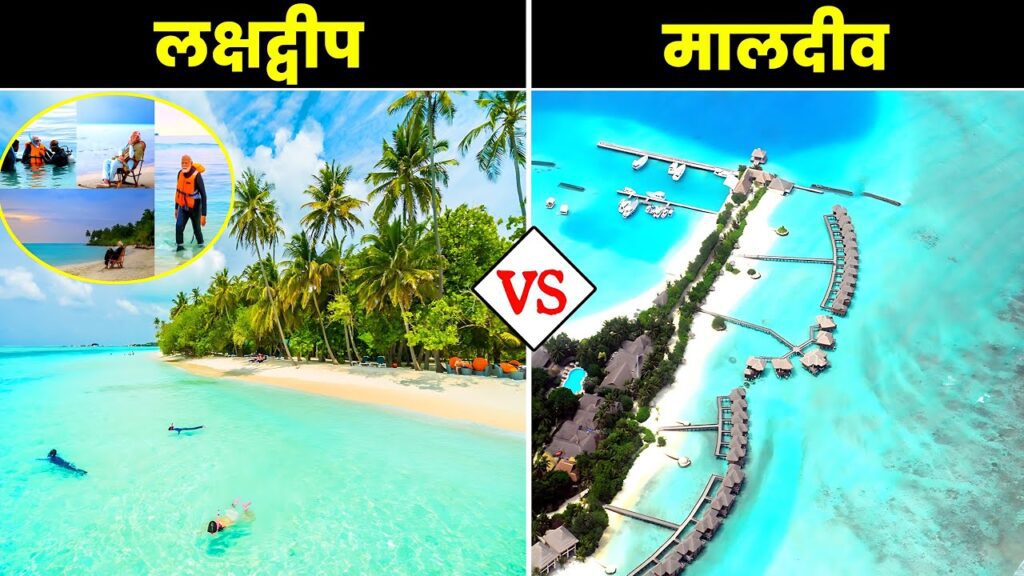The Maldives-Lakshadweep Controversy: A Geopolitical Tug of War Between India and China

Introduction
In early January 2024, social media posts by some Maldivian ministers accusing India and PM Modi of trying to undermine Maldives’ tourism with photos of Lakshadweep sparked outrage. This led to calls for boycotting Maldives by Indians and brought years of friendship between the two countries into jeopardy. However, the roots of the controversy go much deeper than a perceived rivalry between the idyllic island destinations. The incident highlights the geopolitical tug-of-war between India and China over influence in Maldives that has shaped the country’s internal politics for years.
Outline
- Maldives’ Heavy Reliance on Tourism and India
- Tourism accounts for 28% of Maldives’ GDP and 90% of government tax revenue
- India is the number one source of tourists for Maldives
- This makes maintaining good relations with India economically crucial
- India’s Security Role and Influence in Maldives
- India gifted helicopters, conducts maritime surveillance, patrols EEZ as per Maldives’ request
- India’s neighborhood-first policy strengthened ties with Maldives and other South Asian nations
- Efforts to counter China’s increasing presence in the Indian Ocean region
- The Rise of Anti-India Sentiments in Maldives’ Internal Politics
- Opposition parties adopt “India Out” rhetoric to discredit ruling pro-India party
- Concerns over confidential defense agreements with India used to fuel nationalism
- Parties alternately align with India or China as they gain power
- The Controversy as Part of the Geopolitical Tug of War
- Current ruling party campaigned on anti-India nationalism and wants Indian forces out
- Timing aligns with President’s maiden visit to China amid outreach to Chinese tourists
- Reveals how India-Maldives ties change with power equations in Maldivian politics
- Impact on Tourism and Environment
- Boycott calls have economic consequences but can swing with political changes
- Need for sustainable tourism that respects local ecology and people
The Geopolitical Significance of Tourism in Maldives
Maldives is heavily dependent on tourism, which accounts for over a quarter of its GDP. With a small population of just 500,000 people scattered over hundreds of islands, tourism is a lifeline. The 1.7 million annual tourists drastically outnumber locals.
India tops the list of source countries, making it critical for Maldives to maintain good relations. The 200,000 plus Indian tourists spent almost $500 million in Maldives in 2023. Loss of this business can be devastating for the economy.
The political party in power needs to align with India for economic security. Parties have alternately adopted “India First” or “India Out” rhetoric based on electoral agendas. But anti-India stance has consequences, forcing course correction.
India’s Strategic Interests and Investments in Maldives
India has developed significant security ties and made large investments in Maldives. This includes gifting helicopters, maritime surveillance for terrorism, patrolling the EEZ, and major infrastructure projects.
India aims to counter China’s influence under its Neighborhood First policy. China has been making strategic inroads in Maldives and the Indian Ocean region through projects under the BRI. India is trying to limit its sphere of influence.
But the opaque defense agreements have fueled nationalism and anti-India sentiments. The secrecy has allowed opposition groups to claim infringement on sovereignty and democratic rights. Calls for “India Out” have gained ground.
The Domestic Politics Behind the Controversy
The controversy was triggered by the current ruling party’s electoral plank of anti-India nationalism. The President has openly asked for withdrawal of Indian military presence from Maldives.
This is the third instance of foreign policy reversal with change in ruling party. Parties switch allegiance between India and China depending on political motivations.
Rhetoric around confidential pacts aim to discredit and dethrone the rival pro-India party. But excessive anti-India stance backfires, forcing course correction and impacting elections.
The opaqueness of the defense pacts allowed the opposition to fuel paranoia and outrage. Greater transparency could have blunted accusations of infringing on democracy and sovereignty.
Impact on Tourism and Sustainability
Boycott calls after the controversy led to cancellations by Indian tourists. This disrupted a vital source of income during peak season.
But tourism flows fluctuate with the political equations and tenure of parties. Anti-India slant eventual gives way to course correction and revival of India First policy.
There are also ecological concerns around unsustainable tourism and commercialization. Many inhabited islands have been converted to resorts, affecting local communities.
Promoting tourism must balance economic needs with ecological and cultural sustainability. Local biodiversity and the interests of indigenous communities need to be prioritized.
Frequently Asked Questions
Q. How did the social media comments spark the Maldives-Lakshadweep controversy?
A. Some Maldivian ministers accused India of using Lakshadweep’s photos to undermine Maldives’ tourism. This provoked outrage and boycott calls in India.
Q. Why is India so involved in security and investments in Maldives?
A. India aims to counter China’s growing influence in Maldives and greater Indian Ocean region under its Neighborhood First policy.
Q. How has anti-India stance become part of Maldives’ domestic politics?
A. Parties adopt “India Out” rhetoric when in opposition to discredit the incumbent pro-India party and whip up nationalism.
Q. How does tourism get impacted by the changing political equations?
A. Boycott calls lead to cancellations but tourism revives when parties switch back to pro-India stance after electoral wins.
Q. What are the concerns around tourism in Maldives?
A. Over-tourism has an ecological impact and indigenous communities lose out on inhabited islands converted to resorts.
Q. What could India have done differently in Maldives?
A. Greater transparency in defense pacts could have prevented exploitation by opposition groups to fuel paranoia against India.
Q. How does this controversy relate to geopolitical rivalry between India and China?
A. It highlights how India-Maldives ties fluctuate with power equations as parties use anti-India rhetoric for electoral gains and to get closer to China.